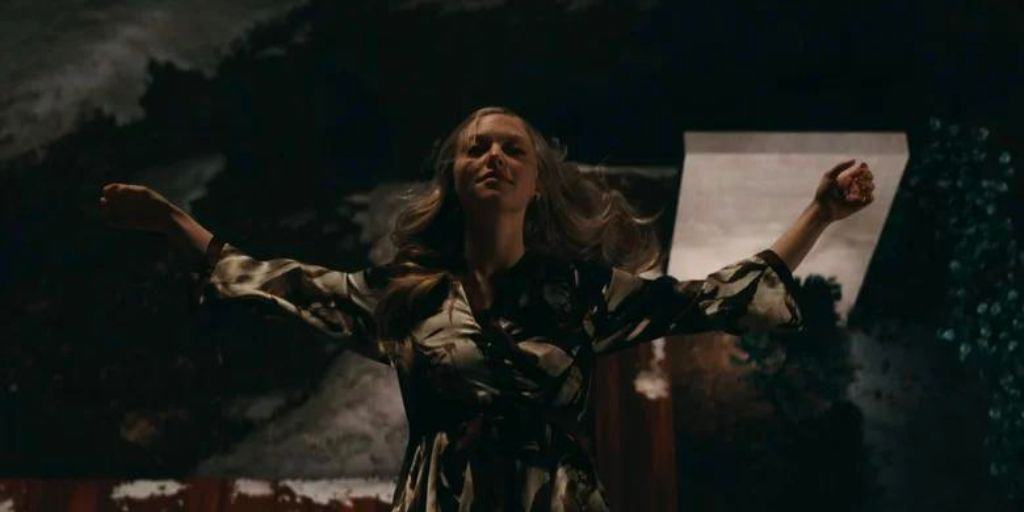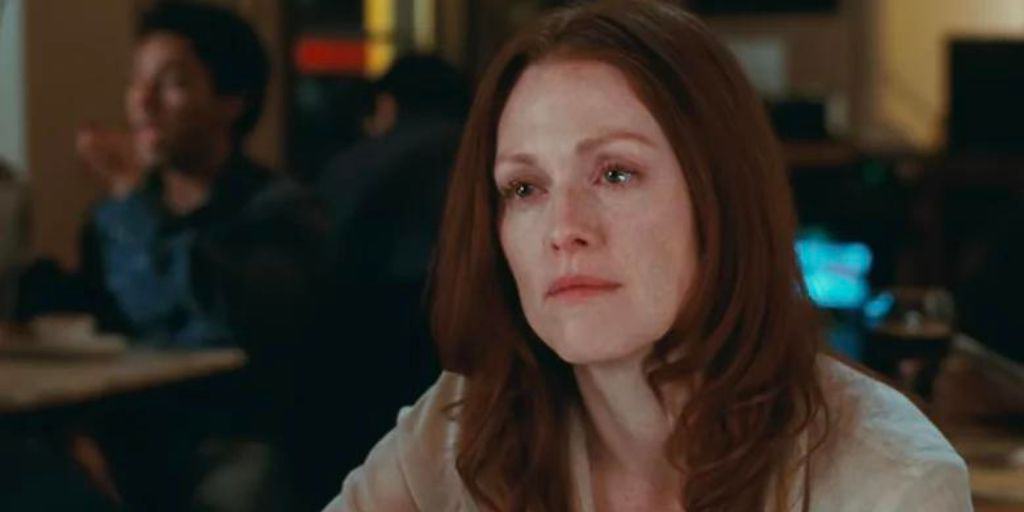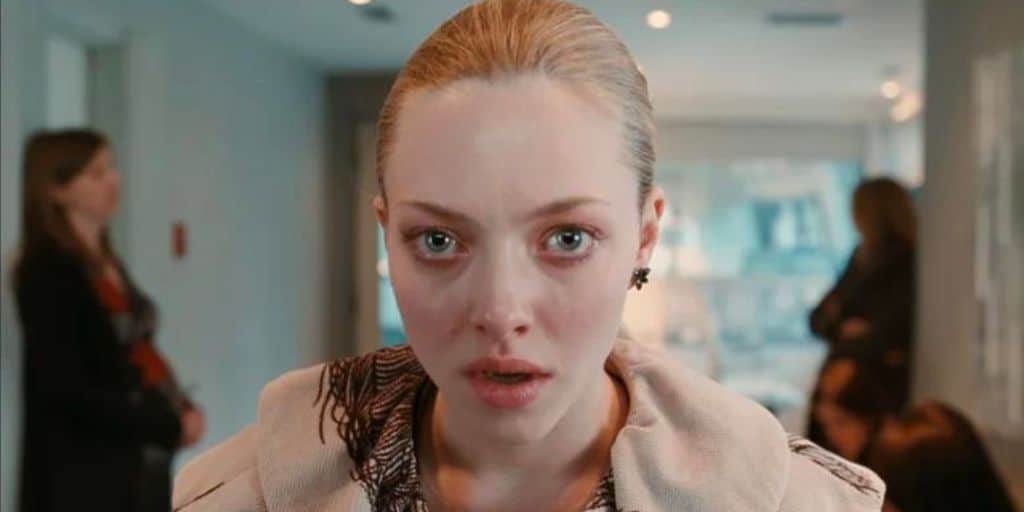With “Exotica,” a meditation on sex, money, and loneliness set among the staff and patrons of a posh Toronto strip club, Canadian director Atom Egoyan burst onto the international independent film scene in 1994.
In the sensual thriller “Chloe,” which was released 15 years later, the director returned to the same world but from a different perspective.
Here, the titular sex worker (Amanda Seyfried) operates out of a posh hotel lobby rather than a smokey club, and her clientele isn’t a roomful of rich but sad men, but rather one guy at a time—or in this case, one lady.
A middle-aged doctor named Catherine (Julianne Moore) feels unnoticed by her husband David (Liam Neeson) and son Max (Max Thieriot), who is just a teenager. But it costs more than she could have anticipated for her to fulfill her yearning to be seen, touched, and loved once more.
The secrets of “Chloe” have less to do with the plot’s turns and more to do with how love and intimacy might drift apart as a result of a traumatic event or the gradual passage of time.
Alternatively, David asks towards the end of the movie, “When did we stop picking each other up from the airport?” The movie’s abrupt turn into the “Fatal Attraction” area raises several unsolved problems, as the epilogue shows a young woman dead and a family that is not only unaffected by her death but also appears to have benefited from it.
Also Read: Chloe Grace Moretz‘s Dating History: All Her Known Relationships
Chloe Movie Plot
Successful Toronto gynecologist Catherine Stewart has a suburban home and a minimalist, ultramodern office. When speaking to a patient who has never experienced an orgasm, she downplays the experience as little more than a muscular contraction, starting the movie off as icy and closed off as her surroundings.
David, her spouse, is the exact opposite: a cherished university professor who is a perpetual flirt. He is a tall, gorgeous older man. After a business trip to New York, Catherine discovers a compromising photo on his phone and becomes suspicious that he is cheating.
Catherine resolves to capture David in the act rather than confront him about her concerns, so she hires Chloe, an escort who works at the opulent hotel just next to Catherine’s office, to seduce him and report back.
Chloe performs her duties admirably. Catherine is horrified and drawn to the young lady’s claims of having sex with David, and despite her best efforts, she can’t help but use the woman as a kind of sexual surrogate.
At the reception following Max’s piano recital, Catherine becomes alarmed when she notices David’s hand on a waitress’ arm. Chloe (who was on a date with a client) is discovered by her, and she is dragged up to her hotel room. Catherine sleeps with Chloe because she is desperate to find out how her husband feels about another woman.
Also Read: The Hauntings Of Myrtle’s Plantation: Chloe And Ghosts

Chloe Movie Ending Explained
Following their passionate night together, Chloe develops an obsession with Catherine and visits her workplace while flirting with Max. Even worse, David now believes she may be having an affair.
To clear the air, Catherine, who is feeling guilty, schedules a meeting for the three of them. However, when Chloe shows up, it is evident to her that David and the young woman have never truly met.
Chloe’s sexual tales of their encounters in the park were but that—stories. Chloe leaves right away, but the encounter provides Catherine and David a chance to finally rekindle their physical and emotional connection.
Catherine leaves for home on her own, but she is not alone, as David has returned to work. Chloe went to their home and had sex with Max as she and David were making up. In the upstairs bedroom, Catherine discovers the two of them dozing off.
She confronts Chloe after being shocked and horrified, but Chloe assaults her with the jagged silver hairpin they had discussed earlier. One of the large windows of the house breaks during the conflict.
Chloe clings to the window frame before falling through the shattered glass below and dying. A few months later, the Stewarts throw Max and his buddies a graduation celebration at their house.
The family is still intact and remains an important part of the neighborhood. When Catherine turns back, we notice that she is sporting Chloe’s hairpin while she is grinning at her sons.
The movie plays with the idea that Catherine perceives not just Chloe but every female character as a reflection of herself—often an unfavorable one—even before she wears the trademark hairpin towards the end of the movie.
Patients like the one who has never experienced an orgasm or the dancer whose professional discipline has prevented her from experiencing the most fundamental pleasure are examples of those who are approaching motherhood at the same time as she is concluding her own.
David makes flirtatious overtures to a red-haired waitress who resembles a youthful Catherine. At that dinner, Catherine’s coworker (R.H. Thomson) teases Catherine about how many tables are filled with wealthy older men and young women whose attention has been paid while David flirts with the red-haired waitress.
Also Read: What Episode Does Chloe Find Out About Lucifer?

The sight of older men with younger women haunts the movie long after Catherine is scandalized by it. Couples with the same dynamic are prevalent in Egoyan’s backdrop scenes.
It serves as a visual allusion to Catherine’s concerns about David—an older guy who is frequently seen with women who are decades younger than he is—as well as a preview of her relationship with Chloe.
In the end, Catherine isn’t all that different from those men at the restaurant—a wealthy older man having sex with a young girl who is fond of him.
Chloe kisses Catherine while they struggle towards the movie’s climax, with the hairpin causing Catherine’s neck to bleed. Chloe is pushed away by Catherine when she notices Max watching via the bedroom window’s reflection.
The window is thrown out of its frame by the power of the collision. Chloe reaches for the frame, but her grip slips a moment later, and she drops to the floor. We can tell that this is not a murder because of Catherine’s current panic.
Although she didn’t mean to murder Chloe with her shove, it’s unclear what was going through her head. There is no way she could have expected or planned this conclusion, but the issue still stands: Did she let go on purpose or was her fall from the window an accident?
The alternative endings of the movie provide clearer answers to this query, but in the theatrical edit, the scene is unclear. Chloe’s fall is shown by Egoyan in slow motion with a contented look on Seyfried’s face, strongly suggesting that her planned death was a strategy to remain in Catherine’s life forever.
However, other aspects make the fall from the second-story window (even upon broken glass) not necessarily fatal, such as the way her hand holds the window frame before slipping away. However, the outcome for the characters is the same whether it was done on purpose or due to a bad turn of events.
Even though his films are frequently up to interpretation, Egoyan asserts in a 2010 interview for The Rumpus that Catherine is “Chloe’s” unmistakable antagonist.
The tragic plot is started by her yearning for control—to be in command of not just her own life but also the lives of her husband and children. He acknowledges, “She’s making a pretty weird choice.
There are alternatives to hiring a prostitute if you need to demonstrate that someone is having an affair. All of Catherine’s activities, including the final shot of her sporting Chloe’s hairpin, are driven by her intense craving for control.
Although “Chloe” is ostensibly based on “Nathalie,” author Jeffrey Edalatpour notes in this interview that the film has more in common with Pier Paolo Pasolini’s 1968 drama “Teorema,” in which Terence Stamp plays a mysterious, possibly supernatural visitor who seduces an entire bourgeois Italian family before disappearing and leaving them to consider their actions.
He believes that the manner Chloe is depicted in death by Egoyan—falling to the earth in slow motion like a “fallen angel”—is another evidence that her presence in the Stewarts’ lives is meant to serve as a warning or possibly a punishment for their affluent lifestyle. Egoyan admits to enjoying the Passolini movie but claims that any similarities were unintentional.



